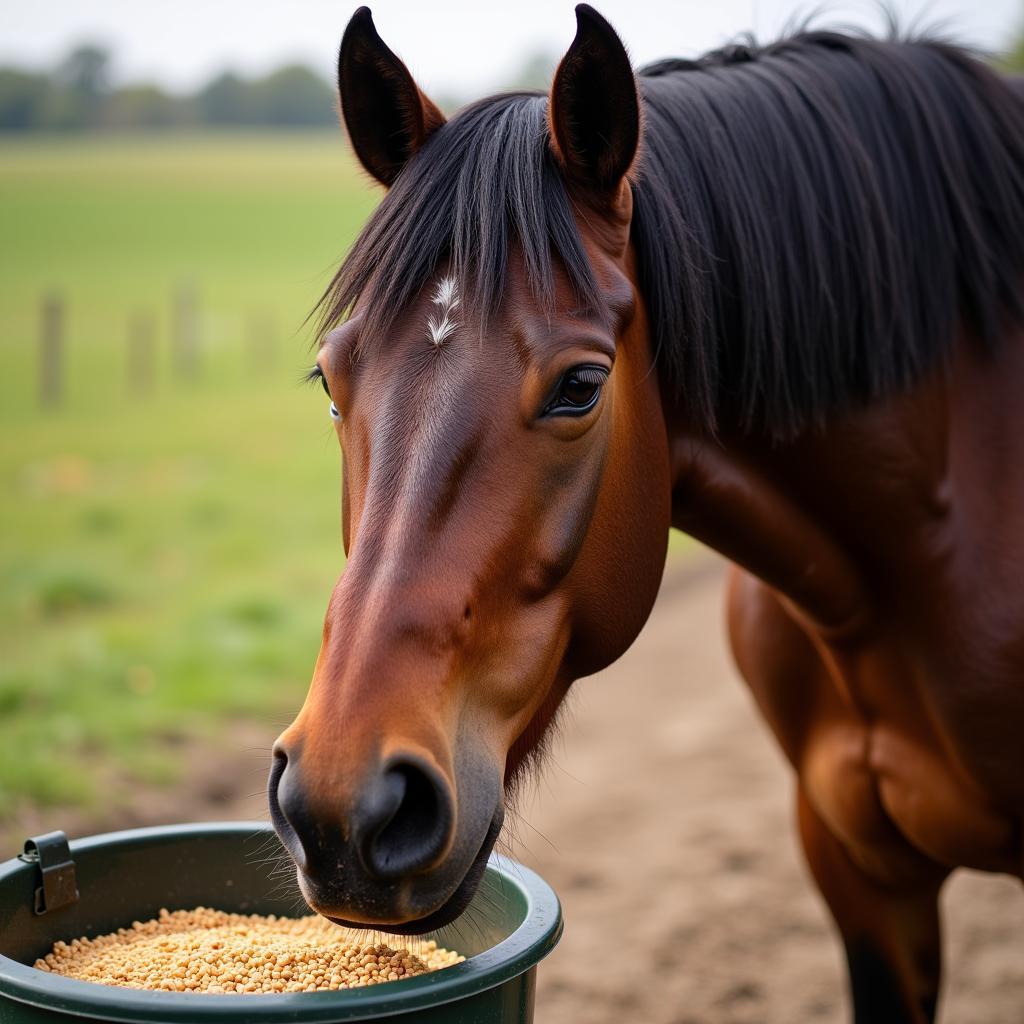Hard tack for horses, a type of concentrated feed historically used for equines, particularly in military campaigns or during times of scarcity, continues to intrigue horse owners today. What exactly is hard tack, and was it truly a suitable feed for horses? Let’s delve into the history and nutritional aspects of this intriguing feed.
Hard tack wasn’t designed specifically for horses but rather for humans. It’s essentially a simple biscuit made from flour and water, baked multiple times to remove moisture and extend its shelf life. While horses could consume it, the question of its nutritional value and suitability as a primary feed source remains. Its primary advantage was its longevity, not its nutritional profile. Let’s explore the historical context of using hard tack for horses and compare it to modern equine nutrition. You can find more information about horse care and equipment at our horse halter for sale page.
The History of Hard Tack for Horses
During the 19th century, especially in times of war, hard tack became a staple for both soldiers and their horses due to its ease of transport and long shelf life. In situations where fresh forage and grains were unavailable, hard tack provided a source of calories, preventing starvation. However, it lacked essential nutrients vital for a horse’s health and performance. The practice was born out of necessity, not ideal feeding practices.
Was Hard Tack a Good Feed for Horses?
While hard tack prevented starvation, it wasn’t a nutritionally complete feed. Horses require a complex diet rich in fiber, protein, vitamins, and minerals. Hard tack primarily provided carbohydrates, lacking essential nutrients for long-term health. Prolonged reliance on hard tack could lead to malnutrition and various health problems.
Modern Equine Nutrition vs. Hard Tack
Today’s understanding of equine nutrition emphasizes the importance of balanced rations. Modern horse feed formulations provide the specific nutrients needed for various life stages and activity levels. Unlike hard tack, these feeds incorporate hay, grains, and supplements to meet a horse’s dietary needs. Learn more about different horse breeds, like the Dartmoor horses for sale.
What Nutrients Do Horses Need?
Horses require a diet rich in fiber from forage like hay or pasture, which supports their digestive health. They also need carbohydrates for energy, protein for muscle development and repair, and essential vitamins and minerals for overall well-being. Modern feeds are formulated to provide these nutrients in the correct proportions.
Why Hard Tack Isn’t Recommended Today
While historically relevant, hard tack is no longer a recommended feed for horses. Its nutritional deficiencies can lead to serious health problems, including malnutrition, digestive issues, and poor performance. Modern feeds provide a balanced and complete diet, ensuring optimal health and well-being. Check out our article about green broke horse for more training information.
“Hard tack was a survival food, not a thriving food. It kept horses alive in desperate times, but it certainly wasn’t ideal,” explains Dr. Amelia Cartwright, DVM, specializing in equine nutrition. “Modern equine nutrition provides a balanced approach, ensuring horses receive all the necessary nutrients for optimal health.”
What Should I Feed My Horse Instead of Hard Tack?
Provide your horse with a balanced diet based on good quality forage, supplemented with commercially available horse feed appropriate for their age, activity level, and specific needs. Consult with an equine nutritionist or veterinarian for personalized dietary recommendations. For DIY projects related to horses, you can find information about Masterforce saw horses. You can also explore our collection of antique horse hames for historical interest.
 Healthy Horse Enjoying Modern Feed
Healthy Horse Enjoying Modern Feed
In conclusion, Hard Tack Horse feed served a historical purpose but is no longer suitable for modern horse care. Today, we have a much better understanding of equine nutrition and access to a variety of balanced feeds that meet a horse’s specific dietary needs. Prioritizing a complete and balanced diet ensures your horse’s health, longevity, and overall well-being.
FAQ
- Can horses digest hard tack? Yes, horses can digest hard tack, but it’s not an ideal food source.
- What is the primary ingredient in hard tack? Hard tack is primarily made from flour and water.
- Why was hard tack used for horses? Hard tack was used for horses due to its long shelf life, especially during times of war or scarcity.
- Is hard tack nutritious for horses? No, hard tack lacks essential nutrients vital for a horse’s health.
- What should I feed my horse instead of hard tack? Feed your horse a balanced diet of good quality forage, supplemented with commercially available horse feed.
- Can hard tack harm my horse? Long-term reliance on hard tack can lead to malnutrition and various health problems in horses.
- Where can I learn more about equine nutrition? Consult with an equine nutritionist or veterinarian for personalized dietary recommendations for your horse.
“Remember, feeding your horse a balanced diet is a crucial aspect of responsible horse ownership,” reminds Dr. Cartwright. “Consult with a professional to ensure your horse receives the proper nutrition for a long and healthy life.”
You can find more information on our website regarding horse care. Consider reading more about horse health, training, and equipment.
When you need assistance, please contact us at Phone Number: 0772127271, Email: [email protected], or visit our address: QGM2+WX2, Vị Trung, Vị Thuỷ, Hậu Giang, Việt Nam. We have a 24/7 customer service team.